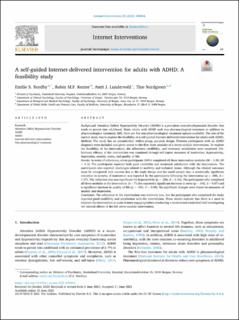| dc.description.abstract | Background
Attention Deficit Hyperactivity Disorder (ADHD) is a prevalent neurodevelopmental disorder that tends to persist into adulthood. Many adults with ADHD seek non-pharmacological treatment in addition to pharmacological treatment. Still, there are few non-pharmacological treatment options available. The aim of the current study was to explore the feasibility of a self-guided Internet-delivered intervention for adults with ADHD.
Methods
The study has an uncontrolled, within-group, pre-post design. Thirteen participants with an ADHD diagnosis were included and given access to the first three modules of a seven-module intervention. To explore the feasibility of the intervention, the adherence, credibility, and treatment satisfaction were examined. Preliminary efficacy of the intervention was examined through self-report measures of inattention, hyperactivity, depression, anxiety, stress, and quality of life.
Results
In terms of adherence, seven participants (54%) completed all three intervention modules (M = 1.85, SD = 1.3). The participants reported both good credibility and treatment satisfaction with the intervention. The participants also reported challenges related to usability and technical issues. Although the clinical outcomes must be interpreted with caution due to the study design and the small sample size, a statistically significant reduction in severity of inattention was reported by the participants following the intervention (p = .006, d = 1.57). The reduction was non-significant for hyperactivity (p = .326, d = 0.33). The participants who completed all three modules in the intervention (n = 7) also reported a significant decrease in stress (p = .042, d = 0.67) and a significant increase in quality of life (p = .016, d = 0.99). No significant changes were found on measures of anxiety and depression.
Conclusion
The adherence to the intervention was relatively low, but the participants who completed the study reported good credibility and satisfaction with the intervention. These results indicate that there is a need to improve the intervention to make it more engaging before conducting a randomized-controlled trial investigating the clinical effects of the full seven-module intervention. | en_US |

